Obama: Economic equality is our great unfinished business
- Published
- comments
US President Barack Obama: "Because they marched, America became more free and fair"
US President Barack Obama has linked the ongoing struggle for economic equality in America with the goals of the 1963 March on Washington, in a speech marking its 50th anniversary.
Mr Obama, the first black US president, said ensuring economic opportunity was "our great unfinished business".
He also linked his own rise to the White House with the efforts of the civil rights protesters decades ago.
Members of Martin Luther King's family and veterans of the march also spoke.
Mr Obama gave his address at the Lincoln Memorial on the National Mall in Washington DC almost 50 years to the minute after Martin Luther King Jr culminated the march with his celebrated I Have a Dream speech
The time - 15:00 local time (19:00 GMT) - was marked by ringing bells.
Mr Obama began by honouring King, as well as the many African-American and white marchers who descended on Washington to protest for equal rights for black citizens 50 years ago.
"They assembled here, in our nation's capital, under the shadow of the great emancipator, to offer testimony of injustice, to petition their government for redress and to awaken America's long-slumbering conscience," Mr Obama said.
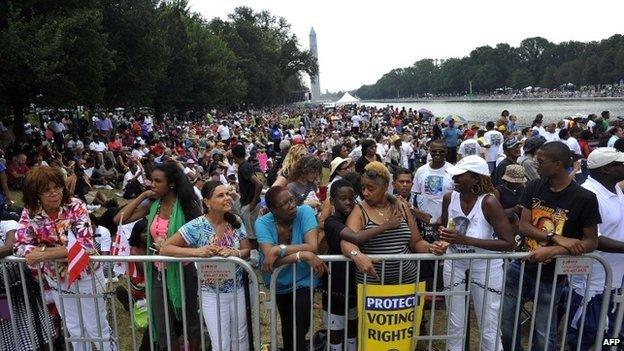
Thousands of people have braved rain in Washington DC to commemorate a half century since Martin Luther King's "I have a dream" speech
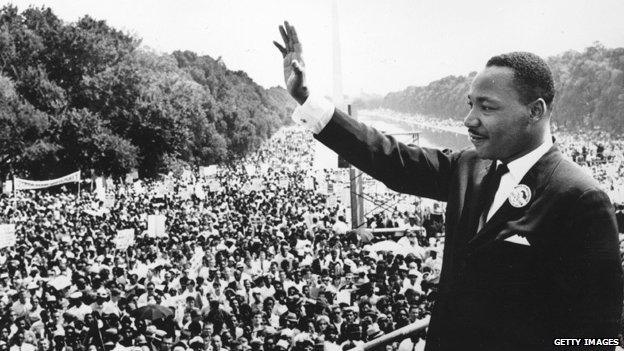
The civil rights leader delivered his legendary address to some 250,000 protesters at the Lincoln Memorial in America's capital city
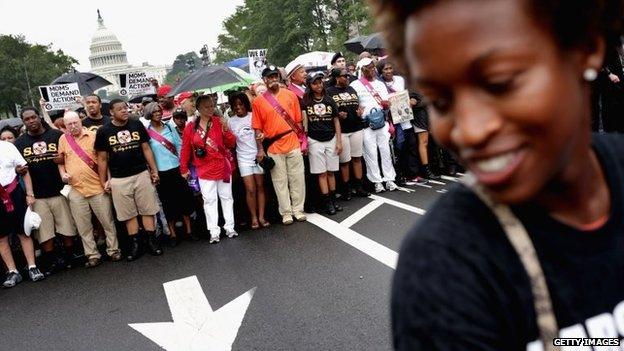
Americans of all backgrounds and colours massed on Washington DC's National Mall to remember the event that gave the civil rights movement unstoppable momentum
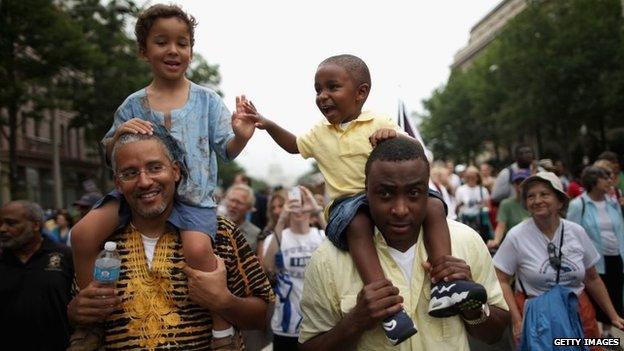
Young and old, they gathered to witness a moment rich with history and symbolism: Barack Obama, the first black president, made a speech from the spot where King envisaged his dream
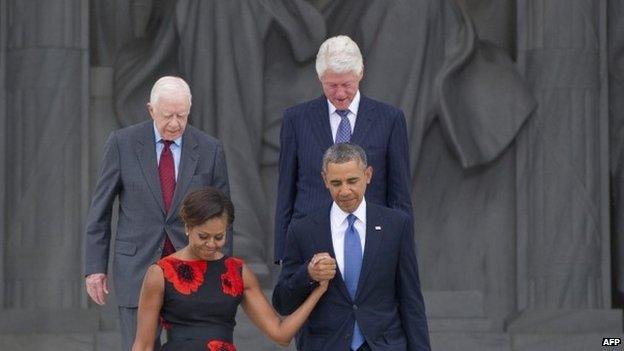
US President Barack Obama was joined by two of his predecessors in the White House, Bill Clinton and Jimmy Carter
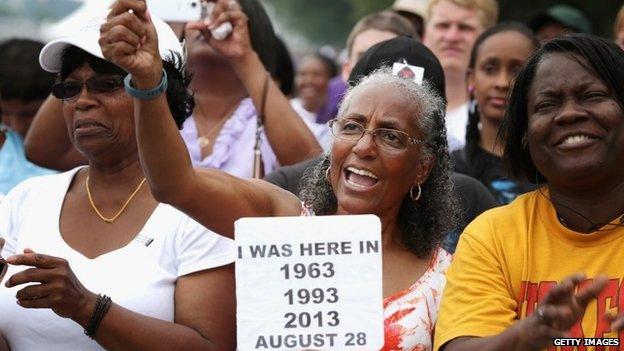
Some of those at the event attended the original speech
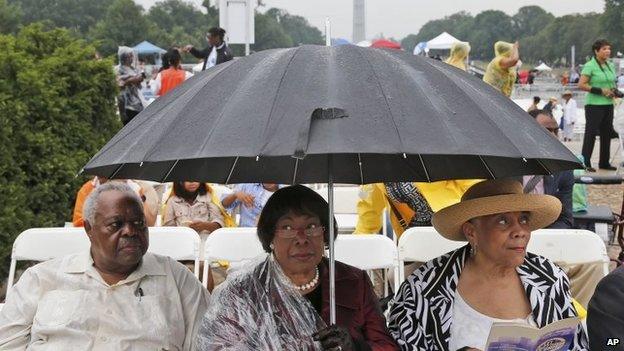
Organisers of the rally broadened the focus beyond racial issues, to address the environment, gay rights and challenges faced by those with disabilities
"Because they marched, city councils changed and state legislators changed and Congress changed, and yes, eventually the White House changed," Mr Obama said to great cheers. "Because they marched, America became more free and fair."
He praised "those maids, those labourers, those porters, those secretaries" who had transformed the US into the nation "our children now take for granted", in which individuals of different races mix freely in public and private life.
"To dismiss the magnitude of this progress," he said, "to suggest, as some sometimes do, that little has changed - that dishonours the courage and the sacrifice of those who paid the price to march in those years."
But Mr Obama argued "the very significance of these victories may have obscured a second goal of the march" - jobs and the promise of equal economic opportunity.
"They were there seeking jobs as well as justice," he said.
"We must remind ourselves that the measure of progress for those who marched 50 years ago was not merely how many blacks had joined the ranks of millionaires," Mr Obama said.
"It was whether this country would admit all people who were willing to work hard, regardless of race, into the ranks of a middle-class life.
"To win that battle, to answer that call - this remains our great unfinished business."
The US president, who has clashed with Republicans in Congress over his economic policies, criticised "entrenched interests" and "elected officials who found it useful to practice the old politics of division".
But he said the 1963 march "teaches us that we are not trapped by the mistakes of history, that we are masters of our fate".
Mr Obama was joined on the stage by former Presidents Bill Clinton and Jimmy Carter, who also spoke.
Former President George W Bush, who is recovering from a heart procedure, sent a message of support.
In his statement Mr Bush said Mr Obama's presidency reflected "the promise of America" and "will help us honour the man who inspired millions to redeem that promise".
Chat show host Oprah Winfrey and actors Forest Whitaker and Jamie Foxx also attended the event.
Wednesday's rainy commemoration began with marchers walking the streets of Washington DC behind a replica of the bus once ridden by seamstress Rosa Parks when she refused to give up her bus seat for a white passenger in 1955.
Half a century ago, Martin Luther King led some 250,000 protesters down the same strip and delivered his famous speech, external from the steps of the Lincoln Memorial.
"I have a dream that my four little children will one day live in a nation where they will not be judged by the colour of their skin but by the content of their character," he said, in one of the most celebrated pieces of American oratory.
His address marked the peak of a series of protests against racial discrimination that began when Rosa Parks launched the bus protests.
Her action sparked a bus boycott campaign across Montgomery, Alabama.
Some African-Americans still face discrimination, as Mark Mardell reports
King became a dominant force in the movement and so was called on to make the final speech at the march.
He advocated the use of non-violent protest such as sit-ins and protest marches, and was awarded the Nobel Peace Prize in 1964.
Four years later, his assassination led to rioting in more than 100 US cities.